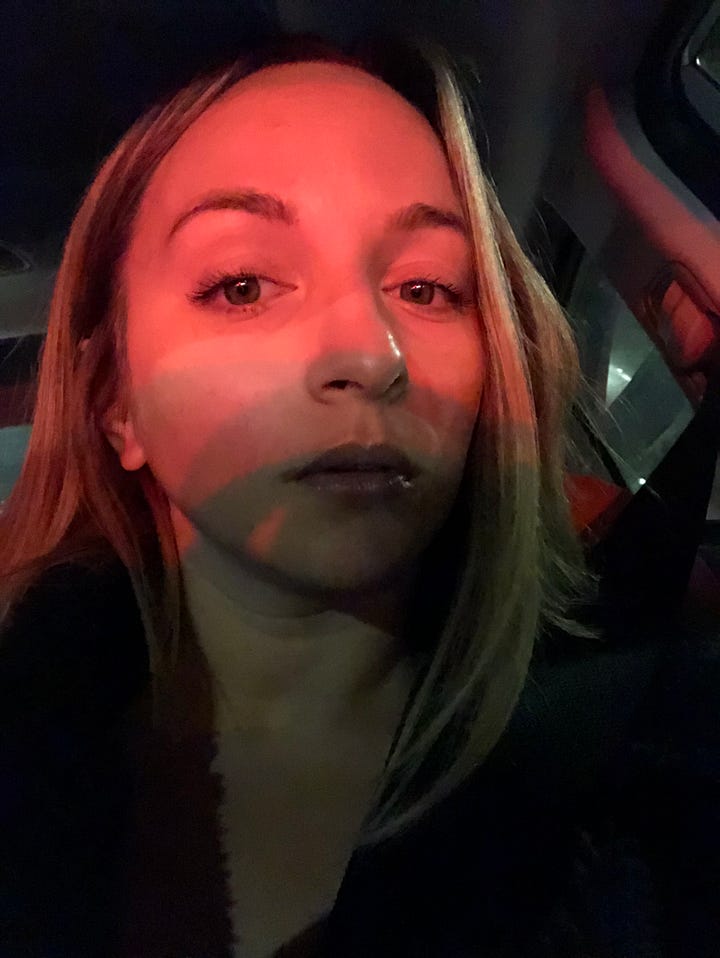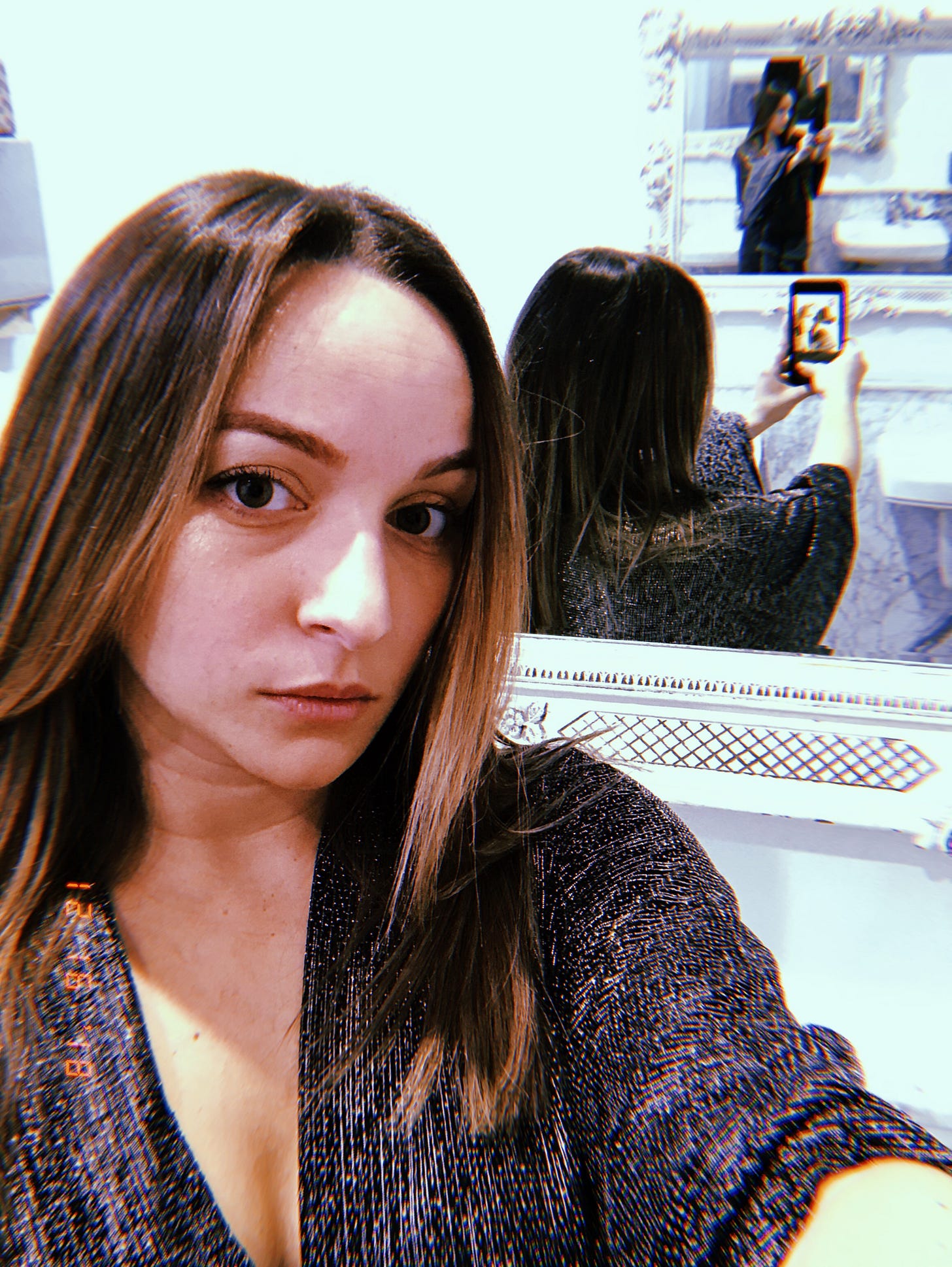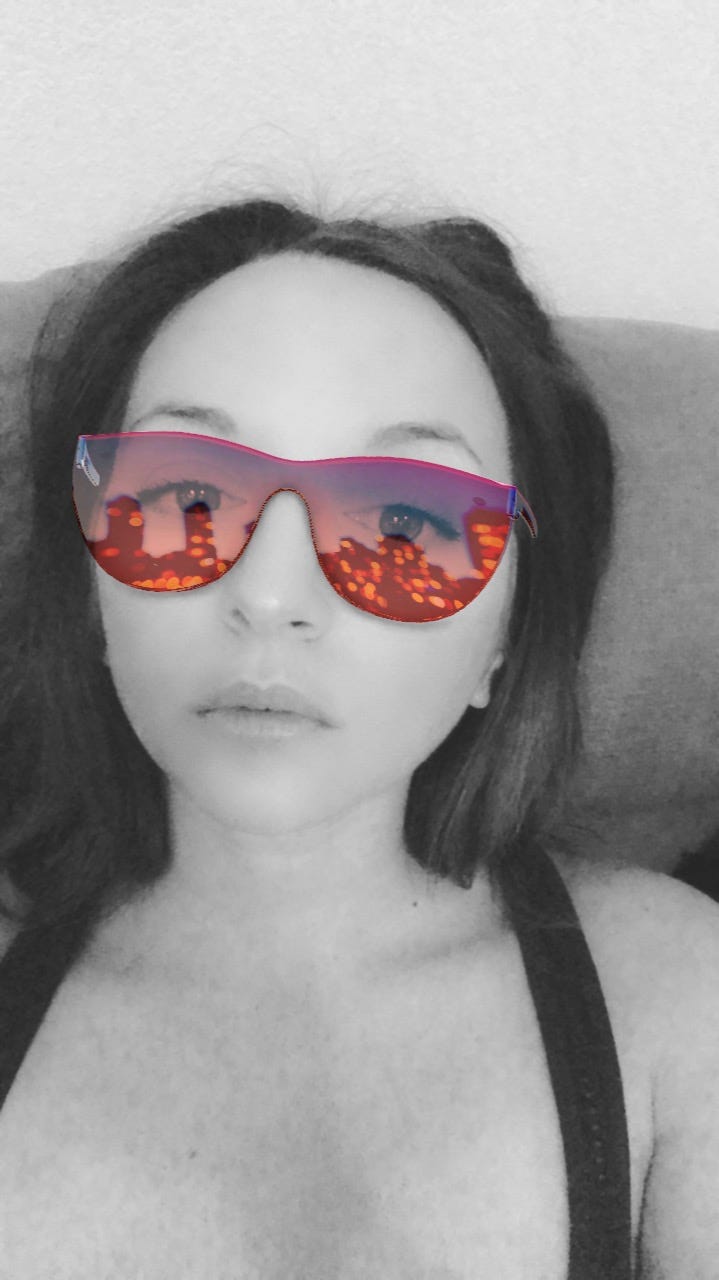In the fall of 2011, my boyfriend takes a picture of me on a date. We’re in Westwood having sushi before driving to a party. At the party, he will get so drunk that he goes missing. But for now, we share spicy tuna crispy rice. I'm wearing scarf with skulls on it, not the designer brand, but something I bought at Forever XXI for under $20.00. I feel chic and cool, especially when this boyfriend turns the flash on his phone camera and snaps my picture. He says he’s going to post the picture on Instagram. Instagram came out not even a year ago, and I still have a Blackberry phone and not an iPhone, so I haven’t even seen the app’s interface. He finesses the image while we wait for the check, and then he hands me his phone.
The app is blue and white, a cartoon camera as its icon. It feels like a photo album. The aesthetic looks to be influenced by vintage nostalgia and lo-fi photography with its retro-inspired filters with names like Earlybird and Valencia. The platform has a soft, warm, and slightly faded look, reminiscent of Polaroid pictures and analog film photography.
I find the image of myself in a neatly cropped square. The light around me is rainbowed and smooth, or rather, smudged. It’s me and it’s not me. He’s already posted the picture.
I remember wondering about his intention when he’d posted the picture. I knew that his ex-girlfriend had Instagram and that she would see it, that she would see me, and that this photo would signal the boyfriend being over her because he was now with me. I didn’t like that, the weight of all these things that came with just one picture. Why couldn’t we just enjoy our date?
At the end of the night, I find my boyfriend smoking a cigarette in the stairwell of the apartment complex. I drive him home. We break up, and then get back together. Break up, get back together—our relationship like refreshing a screen, waiting to see what new image will arise.
*
The early Instagram aesthetic was less about perfection and more about authenticity and mood, embracing a do-it-yourself quality that contrasts with the hyper-polished, curated visual that dominates today. We used to go for oversaturated pictures, so clearly modified that it was obvious we were trying to make ourselves into art. Now, we simply believe we are already the art; we believe we deserve to be showcased as such.
I first downloaded Instagram in the summer of 2015. I was working at Abercrombie & Fitch and my manager was nuts about the app. She loved posting pictures from her beach days, her snorkeling trips, mirror selfies where she showed off her “ready for work” outfits. I remember thinking it was so stupid, so meaningless. But I also remember it was the summer my grad school boyfriend was traveling across the Pacific Northwest on a mountain bike. Bikepacking. I was alone in our apartment for two solid months, bored out of my mind and at the same time ridiculously afraid that this was the trip that would solidify the end of our relationship. I downloaded Instagram and posted pictures of my food, of the Florida sky after a storm, of myself in the front seat of my car parked outside the mall after a shift, illuminated by the courtesy lights above me.
As my boyfriend rode mile after mile, I spent more and more time curating my account. He was out there, really living, really doing something (albeit something that drove me crazy), but he was moving his body through the world with purpose and intention, and I was zooming in on photos of myself trying to imagine how someone else would view my life from the outside.
I deleted the app at the end of the summer when my boyfriend came home. We broke up six months later, and then I downloaded the app again. He would make an account too and I would comb through his pictures and try to find meaning in them. Was he seeing someone new? Was he happier without me? If he was wearing a shirt I’d purchased for him, did that mean he still loved me?
But it was on Facebook that he’d announce he’d gotten married and was expecting a child with his new wife. I no longer had Facebook, but a mutual friend emailed me a screenshot of the post.
Years later, I had Instagram around the time of my wedding, but I didn’t want to post about it. After a week or so, I finally caved to the pressure and announced to my digital world that I was married. I remember being at the gym and watching the likes flood in. It felt so empty, like a surefire way to devalue the beautiful day we had. I deleted the picture, then deleted the app, then put my phone in a locker.
I would stay off the app for years.
*
I don’t believe that I use social media for the correct reasons. Or rather, I use social media in a negative way, a way that negatively affects me. Maybe other writers feel this way, as words are meant to be words and not photos. “A picture is worth 1,000 words” the saying goes, and if that’s true, then there goes 1,000 of our words down the drain.
I have always clung to social media at times I am most lonely in my life, or when I feel something is missing. I spent a long chunk of time without the app, but when my book was set to be published in the summer of 2021, my publisher suggested I create a new account. “If I get Instagram again, I want it to just be a joke,” I’d said on our phone call. “I don’t want to take it too seriously.” My publisher said as long as I had a place where people could find me, where I posted every so often about the book and my writing, that would be just fine.
I was on a hike when I came up with my username of @suboatmilk. Dairy-free milk alternatives still cost a pretty penny, and in the throes of Covid lockdown, I found myself often online pre-ordering an “iced vanilla latte sub oat milk.” I thought it was funny and cute.
I posted pictures of books I was reading, selfies with silly captions, details of upcoming events for my debut novel. I curated my page to be that of an “author” page, and I wanted everyone to see me as such. In reality, I was eating chicken teriyaki in my car in the farmer’s market parking lot. I was posting and never really present. I was always thinking about what I could post next, what that post would say, what it would mean, what it might bring me in terms of some kind of material success. If people liked it, if more people followed me, it would be evidence that I was real, that I was a real author.
The box of books that arrived at my house didn't seem to elicit that feeling.
The truth is that nothing did. And the other truth is that I’d written my first two books without Instagram, without social media, and without caring about my online identity.
Even as I went to bookstores and saw my novel on the shelves, I was more occupied with getting a good photo of myself with my book or of myself signing the book or of myself laughing in front of the stack of books than I was with the actual, and very real, book that I was holding in all the photos.
Every interview I did, every Zoom reading, in-person reading, every podcast, every press kit piece, I was more concerned with how I would “share” about these occurrences than the events themselves.
I told myself that I just had to get through the book launch and then I could take a break, but that break never happened. Pub month passed and I only felt more urgency to stay relevant and keep the book alive. I felt like everything hinged on how much I stayed active online and how much I, or rather my persona, resonated with others.
And then I went to a venerated writing workshop and had a mental breakdown. I think part of the reason I had such a hard time at this conference and subsequently had to leave after day two was because I only wanted to go so that I could say I went, or I only thought I needed to go because it was important, and not because I actually wanted to be there. I wanted to be seen there.
Of course, I also wanted to belong there. I have participated in many writing workshops and retreats and conferences and it is always partly in effort to achieve some sense of belonging. Do I belong among these other writers? Am I worthy of this space? What am I looking to find here?
I didn’t take one single picture while I was at that conference. It’s as if I didn’t even go.
*
I think a major and probably obvious issue I have with Instagram is how the posts that get the most attention (or likes) are ones where I have some sort of big news. This only fuels the bad habit. When I got a job at Vanderbilt, likes galore, comments aplenty. When I announced I was pregnant, so many hearts and baby bottle emojis. Thus, the implication that you are only worthy if something significant is happening in your life.
For years I have had the inclination to get offline, yet I have done nothing about it. I remember hearing a visiting writer at Vanderbilt talk about how they only go on social media once a week for twenty minutes to answer direct messages and make any posts or announcements and then they log back off and move on. But when I tried that it didn’t work. Was I picking the wrong day, the wrong time? Either way, twenty minutes became an hour; one day became two or three. The whole thing went to shit. I was back online without any boundaries. No self-care to be found.
I was sure that when I had a baby, I wouldn’t be online anymore. Why would I go online when I have an angel-faced child at my side? But with giving birth came the pressure to not vanish as the woman who had a baby and then gave up her writing career.
Yet, nothing, absolutely nothing, is better or more important or more worthy of my time than being with my family. The old habits need to go. I can no longer lean on my past ways of coping.
The times I’ve been happiest, I have been offline. In these times, I have been living my life like it’s the only one I’ve got, and not like it is fodder for content to be posted later. For me, I am not living if I am living for how I will be perceived.


Late last year, I started an essay column that only lasted a few months because I felt silly for trying, for wanting to badly to put myself out there in yet another avenue of being online. I felt bad when the posts weren’t getting a lot of likes or comments. I told my editor that I wanted to stop. “The posts are getting thousands of views,” she told me. “So, it’s not a question of readership. Engagement is down all over the board, but the readership is there. But if you want to stop for you, then you should.”
I ask ChatGPT why engagement is waning. I get reasons such as market saturation and competition and content fatigue and algorithm and feed changes and shifts in user behavior and poor user experience and the lack of incentives and interaction and the declining organic reach. I don’t wish to spend my time on any of these insights.
I ask why being online makes me feel so bad. Overstimulation and information overload, social comparison and unrealistic standards, negative content and doom scrolling, lack of real-world connection, validation seeking and algorithm manipulation, addiction and dopamine crashes, loss of time and productivity guilt. The Internet is telling me this.
I delete Instagram from my phone. I delete the Substack app too. For a few days, my thumb hovers over where the app icons used to live, but they are no longer there.
*
“I want you out of alignment,” my yoga instructor says as we shift into plank with our arms outstretched in front of us. “When you’re out of alignment, your center holds the work. You are thrown off. The center has to take the heat.”
2024 was a painful year for my ego. I threw myself into content because being in the present moment hurt too much. Social media pulls me away for a brief spell of relief, but wanting out of the pain only gets you something slightly less painful.
I have no control over my digital identity. I can’t control engagement or likes, or even how my body of work is perceived and interpreted. But taking a break from being online, I make a conscious choice to come back to myself, to focus on the things that matter most: my family, my health, my writing.
Being in a misaligned plank is uncomfortable, to say the least. It’s an unstable position, until you make it stable. I dig my palms into my mat and tighten my core. I squeeze my legs until the back of my knees burn.
I breathe through the discomfort.
—
Many thanks to New Delta Review for publishing my latest creative nonfiction, “Sugar Sand.”
Check out my latest interview for Write or Die with Aria Aber and her debut novel, Good Girl.
There are only a few spots left in my 8-Week Advanced Nonfiction Workshop with Lighthouse Writer that takes place on Wednesdays, March 19th-May 7th from 3-5pm PST!!






An enlightening and thoughtful piece. It resonated in many ways—how we get so caught up in wanting to have an experience so we can post (instead of posting because we have had an experience). Like, what in the actual f@*# !!!
I always always always find something valuable when I read your work. I hope 2025 will be a great year for your ego ❤️
Deleted IG app off my phone in Dec and caught myself doing that finger phantom search for it before I realized what I was looking for. Crazy stuff.